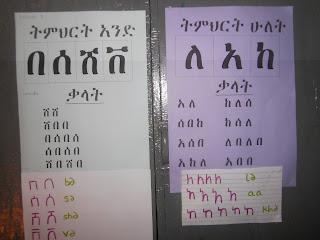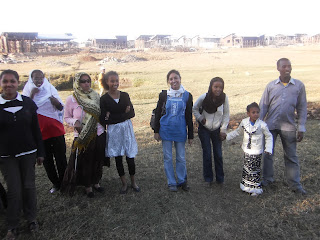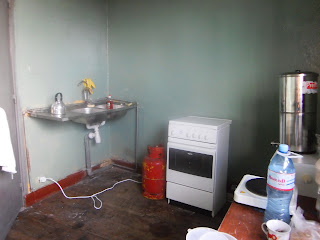My classes at the college are going well (I think!) and trainers at the college are keen to work with me which is great. The classes for trainers still haven’t started yet, but I keep getting assured that they will soon.
I have been advertising the ELIC (-that's English Language Improvement Centre for those that haven't been paying attention-) at the college, as the aim is to make it a welcoming centre for everyone to use when classes aren’t taking place in it. At the moment it is not being used by anyone except for classes; however we want students and teachers to be able to come in and use the centre to improve their English. We want them to come in to read English newspapers and books, or watch English television, or listen to English language cassettes, or even just talk in English. In order to do this, we have arranged certain opening hours and are in the process of organising different clubs for the students. The first club to be up and running will be the Film Club. Every Friday evening we will show an English film or documentary after which we will have a short discussion.

How is my Amharic? Well to be honest I am impressed with myself! I have learnt far more than I ever thought I would before I came here. I learnt French and German at secondary school and hated it. But I have been having Amharic language lessons for the past four weeks now and to my surprise I really enjoy them. The teacher is also teaching us how to read and write Amharic which is a lot of fun.
From the beginning VSO emphasise the necessity of learning the local language - not only to function for shopping and going to the doctor etc., but to engage with the society we are living in, because without engaging with all parts of society one cannot make meaningful change.

From the beginning VSO emphasise the necessity of learning the local language - not only to function for shopping and going to the doctor etc., but to engage with the society we are living in, because without engaging with all parts of society one cannot make meaningful change.
The nights are very cold now, but in the daytime it’s still hot. I have just had the grass in my garden cut, so every day I sit out in the sun and watch the birds or the cloudless sky. Bliss. At night I have started to wear my fluffy nightgown to sleep, plus three blankets which is not so blissful!
As it is difficult to get much exercise here apart from walking, Maeve (the other VSO volunteer) and I have decided to run two mornings a week. We run at 8am before classes start on Wednesdays and Saturdays in the college sports field. The only problem is that every time we go, students gather to watch the funny ‘ferengis’ running for no reason. But I'm determined to become a good runner and running at such high altitude is very good for training.


























